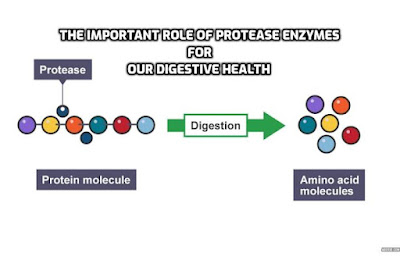Papain enzyme, derived from the papaya fruit, is a natural powerhouse when it comes to aiding digestion. This remarkable enzyme has been used for centuries in traditional medicine and culinary practices.
In this post, we will explore the wonders of papain enzyme, its functions, sources, and how it can be a valuable digestive ally in our modern lives.
Introduction
Papain, often called “nature’s digestive aid,” is an enzyme found in papaya (Carica papaya) and has a long history of use in both traditional medicine and culinary applications. It is renowned for its ability to aid in the digestion of proteins and offer various health benefits.
Understanding Papain Enzyme
Papain is a proteolytic enzyme, meaning it specializes in breaking down proteins into smaller peptides and amino acids. This enzyme is particularly effective in cleaving the peptide bonds within protein molecules, making it easier for the body to absorb and utilize these vital nutrients.
Natural Source of Papain
The primary source of papain is the papaya fruit, especially concentrated in the unripe green papaya. The enzyme is found in higher quantities in the latex of the papaya tree, which can be collected and processed to obtain papain for various uses.
How Papain Supports Digestion
Papain’s role in digestion is crucial. When consumed with meals, papain assists in the breakdown of dietary proteins. It starts in the stomach and continues in the small intestine, ensuring that proteins are efficiently broken down into smaller, digestible components. This can help alleviate common digestive issues such as bloating and indigestion.
Health Benefits of Papain
Beyond its digestive prowess, papain offers a range of health benefits, including:
- Anti-Inflammatory Properties: Papain has demonstrated anti-inflammatory effects and may be useful in managing inflammatory conditions.
- Wound Healing: Due to its ability to break down dead tissue, papain is used in some wound care products to promote tissue repair and wound healing.
- Immune System Support: Papain may help modulate immune responses, potentially enhancing the body’s defense against infections.
Papain Supplements
For those seeking to harness the benefits of papain without consuming papaya fruit regularly, papain supplements are available in various forms, including capsules and powders. These supplements provide a convenient way to incorporate papain into your daily routine.
Incorporating Papain into Your Diet
If you prefer natural sources, consider adding papaya to your diet. Enjoy it fresh, or incorporate it into smoothies, salads, or salsas. Green papaya, which contains higher levels of papain, is often used in savory dishes and salads in some cuisines.
Precautions and Side Effects
While papain is generally considered safe for most individuals when consumed in moderate amounts, some precautions should be taken:
- Allergic Reactions: Individuals with latex allergies may also be sensitive to papain, as they share similar proteins.
- Pregnancy and Breastfeeding: Pregnant and breastfeeding women should consult with a healthcare provider before taking papain supplements.
- Digestive Discomfort: In rare cases, excessive papain consumption can lead to digestive discomfort, including diarrhea or stomach cramps.
Watch this video – Chemistry and Health Benefits of Papain Enzyme
Conclusion
Papain enzyme, found abundantly in papaya, is a natural digestive aid with a wide range of health benefits. Its ability to break down proteins efficiently not only supports digestion but also offers potential advantages for inflammation management, wound healing, and immune system modulation.
Whether you choose to consume papaya as part of your diet or opt for papain supplements, incorporating this natural enzyme into your daily routine can contribute to improved digestive health and overall well-being.




